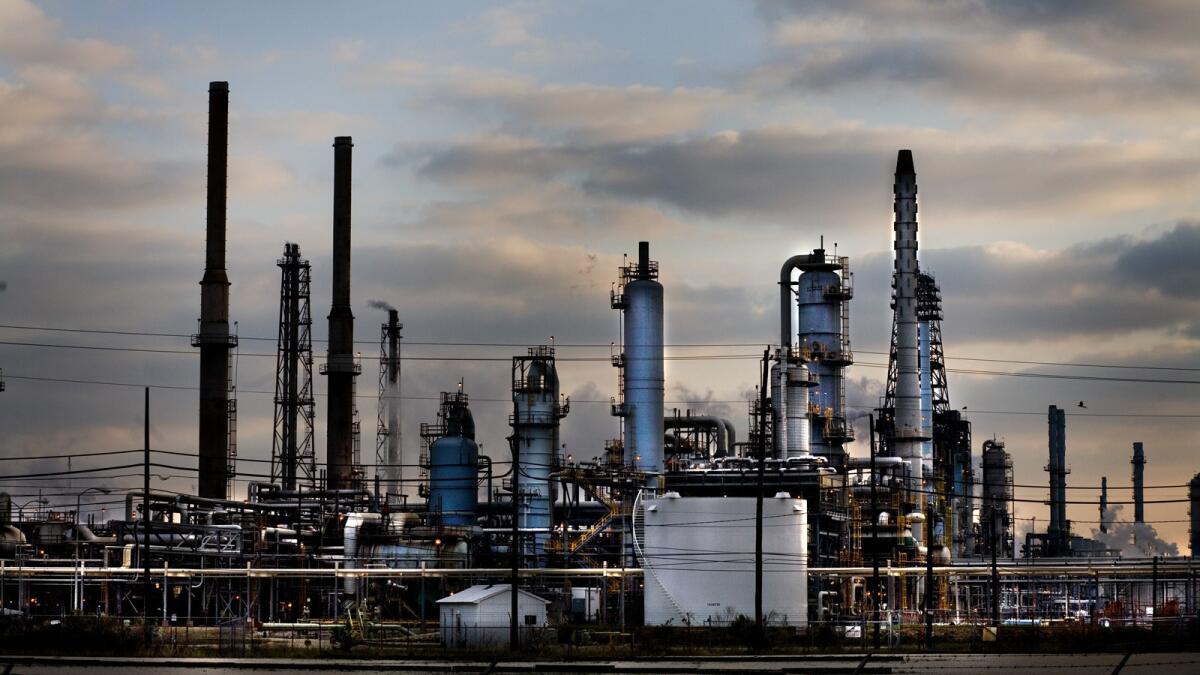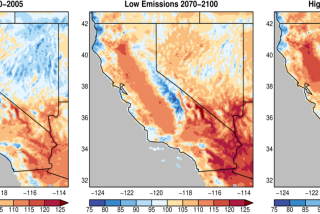New York investigating whether Exxon hid what it knew about climate change

The Exxon gas refinery in Baytown, Texas.
New York’s attorney general has opened an investigation into Exxon Mobil to determine whether the world’s largest oil company misled the public and its shareholders on the risks climate change posed to its business.
The office of Eric Schneiderman sent a subpoena late Wednesday to the company’s headquarters in Irving, Texas, requesting documents dating back to 1977. The company has acknowledged receiving a subpoena and is considering how to respond, according to Richard Keil, company spokesman.
NEWSLETTER: Get the day’s top headlines from Times Editor Davan Maharaj >>
The investigation follows published reports, based on internal company documents, suggesting that during the 1980s and 1990s Exxon, now Exxon Mobil, incorporated climate research into its business practices while simultaneously arguing, in newspaper ads and public statements by company executives, that climate change science was murky.
Those documents were cited in stories by reporters for Columbia University’s Energy and Environmental Reporting Fellowship, published in partnership with the Los Angeles Times, and another story from the nonprofit InsideClimate News.
A number of current and former U.S. senators and representatives, including Hillary Clinton, Bernie Sanders and Al Gore, have called for a criminal investigation into Exxon Mobil, based on those press reports.
“We unequivocally reject allegations that ExxonMobil suppressed climate change research contained in media reports,” Keil said in a company statement
According to a source close to the investigation, Schneiderman is asking not only for documents related to climate research Exxon conducted, but also for any materials related to business decisions the company made knowing the Earth’s atmosphere was warming.
Among the tools at Schneiderman’s disposal is the Martin Act, a New York law that gives the state’s attorney general broad power to prosecute companies for financial fraud.
Unlike federal securities law, the New York statute does not require the state to prove that a company intended to defraud -- only that it misrepresented relevant information, or withheld it from investors. The law applies to any company doing business in the state.
Following the financial crash of 2008, for example, the state attorney general used the Martin Act to file lawsuits against Barclays and Credit Suisse for misleading shareholders.
“The Martin Act is the most powerful prosecutorial law in the nation,” said David J. Kaufmann, a former prosecutor in New York. It gives the state’s attorney general authority to seek criminal as well as civil sanctions against a company. “No other prosecutor has that ability,” he said.
The U.S. Securities and Exchange Commission requires that companies disclose the risks of climate change to their business operations, legal experts say. But the SEC “has taken almost no enforcement actions — to the great frustration of environmental advocates — and so to a certain extent the New York attorney general is jumping into that void,” said Michael Gerrard, a law professor at Columbia.
New York’s attorney general may expand the investigation to other oil companies, a source in the office said, noting that investigators there began looking into Exxon Mobil’s public disclosures on climate change last year. So far, though, no subpoenas have been issued to other oil companies. Schneiderman’s office is also investigating Peabody Energy, the biggest coal producer in the U.S.
Some legal experts compared the investigation to congressional inquiries into the tobacco industry, whose scientists discovered that cigarette smoking caused cancer while their executives publicly denied the health risks of tobacco.
“We may be seeing the opening salvo of litigation akin to the tobacco lawsuits from the 1990s,” said Kenneth Rumelt, a professor at Vermont Law School. “The major difference this time is that the stakes are higher.”
Elah Feder, Michael Phillis and Asaf Shalev contributed to this report.
ALSO:
Can Ben Carson expand his base and stay on top of the GOP field?
Release of Pacific trade agreement sets stage for huge battle before Congress vote
More to Read
Sign up for Essential California
The most important California stories and recommendations in your inbox every morning.
You may occasionally receive promotional content from the Los Angeles Times.






